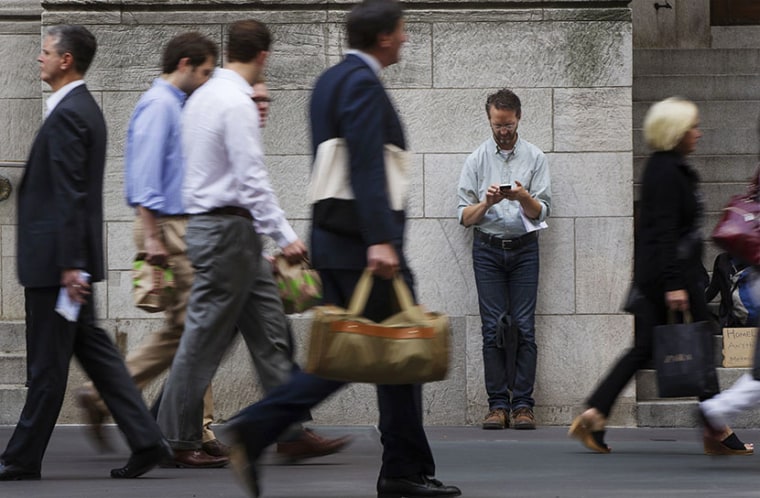The National Security Agency successfully demanded the call records of all Verizon Business Network Services customers in the United States, according to a secret court order obtained by The Guardian.
While the order does not cover the content of phone calls or the identity of customers, it orders Verizon to hand over detailed information including time, duration, and the numbers involved of all calls "between the United States and abroad; or wholly within the United States, including local telephone calls."
"The document shows for the first time that under the Obama administration the communication records of millions of U.S. citizens are being collected indiscriminately and in bulk—regardless of whether they are suspected of any wrongdoing," writes The Guardian. As the paper reports, while this sort of bulk collection began during the Bush administration, the court order provides concrete evidence that the Obama administration has continued the practice.
A senior Obama administration official, without confirming or denying the program’s existence, told NBC News Thursday that the type of information described in The Guardian article has historically been helpful to the U.S. and defended its merits.
“Information of the sort described in The Guardian article has been a critical tool in protecting the nation from terrorist threats to the United Sates, as it allows counterterrorism personnel to discover whether known or suspected terrorists have been in contact with other persons who may be engaged in terrorist activities, particularly people located inside the United States.”
The official added that there is a “robust legal regime in place governing all activities conducted pursuant to the Foreign Intelligence Surveillance Act,” and that all three branches of government are involved in the reviewing of intelligence collection.
The order cites Section 215 of the Patriot Act as justifying the request, but as Cindy Cohn of the Electronic Frontier Foundation told the Washington Post, "Section 215 is written as if they’re going after individual people based on individual investigations.” Michael A. Mason, Verizon's chief security officer, is a former FBI official who joined Verizon in 2008, months before Congress retroactively legalized President George W. Bush's warrantless wiretapping program with then-Senator Barack Obama's support.
Congress has previously passed up opportunities to compel public disclosure about the breadth of domestic surveillance operations. Last December, Democratic Senator Jeff Merkley of Oregon attempted to amend federal law to force the government to disclose more about the secret intelligence court's interpretations of the executive branch's surveillance powers. His amendment was voted down 37-54, with only three Republicans in support.
Another amendment, proposed by Senator Ron Wyden, an Oregon Democrat, would have compelled the NSA to give an estimate of how often the NSA ends up collecting information on Americans--a request the NSA had previously refused to fulfill on the Orwellian grounds that it would violate Americans' privacy for the agency to disclose how often it spies on them.
That amendment was also rejected, 43-52, with most Republicans in the chamber voting against it.
While the breadth of the NSA's request could lead to harsh condemnations from legislators, most senators, and the vast majority of Republicans in the chamber, are on record voting to prevent Americans from knowing anything about it. California Senator Dianne Feinstein suggested during the debate that her Senate colleagues trying to amend the FISA law believed that "that this country no longer needs to fear an attack."
The NSA's request was approved by Judge Roger Vinson, in his capacity as a judge on the Foreign Intelligence Surveillance Court, the secret judicial body that approves surveillance requests against suspected foreign agents in the United States.
Previously, Vinson was best known as the first judge to adopt the argument that the individual mandate in the Affordable Care Act could lead to Americans being forced to buy broccoli, which became a favorite of the law's critics.
Vinson later struck down the Affordable Care Act as unconstitutional, saying that if courts uphold the individual mandate, "we would have a Constitution in name only." Judge Vinson seems to feel less strongly about the Fourth Amendment than he does about the Commerce Clause.
“From a civil liberties perspective, the program could hardly be any more alarming," said Jameel Jaffer, American Civil Liberties Union deputy legal director, in a statement. "It’s a program in which some untold number of innocent people have been put under the constant surveillance of government agents...and it provides further evidence of the extent to which basic democratic rights are being surrendered in secret to the demands of unaccountable intelligence agencies.”
In a memo to employees, Verizon Wireless Chief Counsel Randy Milch said that it could not comment on the accuracy of the The Guardian article.
“Verizon continually takes steps to safeguard its customers’ privacy,” Milch added. “Nevertheless, the law authorizes federal courts to order a company to provide information in certain circumstances, and if Verizon were to receive such an order, we would be required to comply.”
